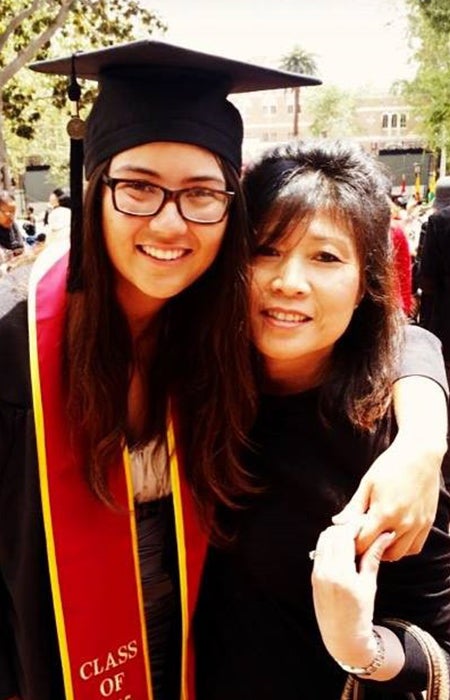
Alumna Jean Kyoung Frazier discusses her novel “Pizza Girl,” basketball, rap and the joy of being a slacker
Alumna Jean Kyoung Frazier’s debut novel, Pizza Girl, stars slackers, stoners, pickle pizza and a pregnant, lesbian pizza delivery driver infatuated with a married mother. If that doesn’t seem like standard fare for a novel, it makes more sense once you meet Frazier, an unofficial champion for those questing for purpose on the edges of society.
“Especially for young people, I think it’s important to have as many examples of different sorts of lives as possible,” says Frazier.
The novel draws from many of Frazier’s own experiences. She delivered pizzas during the summer while studying English at the USC Dornsife College of Letters, Arts and Sciences. She’d also grappled with coming out as a lesbian herself and was eager for fiction that went beyond the standard plots found in much of gay literature.
“We’ve had the coming out story and they’re beautiful and they’ve done a lot for me, but how I see it moving forward now is the art of the casual. Why does coming out and sexuality have to be the focus of the story?” asks Frazier.
In Pizza Girl, gayness is just one part of the character’s story, not her defining characteristic. “She needs to come to terms with her alcoholism, how she is going to be a mother, her relationships with her baby daddy, her own mother and her dead father.”
Pizza Girl debuted in 2020 and nabbed positive reviews from the New York Times Review of Books, People, and Publisher’s Weekly, and was dubbed “the queer slacker pizza delivery novel we’ve been waiting for” by Electric Literature.
Birth of a book worm
Frazier grew up in Torrance, California, but spent her summers in Pelican Rapids, Minnesota, where her father’s family lives. The town has a population of less than 3,000. Its most notable feature is a pelican sculpture, the world’s largest, that overlooks a dam spillway. Her family discouraged watching television and browsed the internet using a dial-up connection. Frazier found herself turning to books for entertainment.
“It’s basically the first time I really fell in love with reading. There was nothing really for me to do but walk around thinking and reading,” says Frazier. She was also encouraged to read by her mother, who immigrated from Korea to the U.S. at age 17.
“She would buy me [books] without hesitation and turned down most everything else,” says Frazier. “I think it really gave her a lot of pleasure, as an immigrant, to have a daughter that took so well to this new culture and her inherited home.”
Frazier’s love of books continued into high school, but she had no early aspirations to become a writer. “I guess I was kind of a slacker in high school. I did a lot of reading but never really saw it as a valid career path,” she says.
Rap and basketball took up most of her time. She wrote verses down in a notebook she carried and played ball on her high school team while lyrics to songs like Skee-Lo’s goofy, swaggering hit “I Wish,” bounced around in her head: “I wish I was a little bit taller / I wish I was a baller / I wish I had a girl who looked good / I would call her.”
Coming into her own
After high school, Frazier enrolled at USC. She signed up as a business major, wanting to honor her mom’s hard work as an immigrant. “I just wanted to do right by her and have a good job, but it just made me so unhappy,” says Frazier.

She considered dropping out but realized she was at her happiest writing poetry, jotting lines down in the same notebook from her high school days. Frazier switched her degree to English and spent her afternoons at the campus bar Traditions, nursing a beer and writing.
From the start, she liked characters that were on the fringe, with questionable morals. One early story centered on a man outlining the lies he’d told his wife. Using a male character could act as a shield for Frazier’s own queer identity, which she was still growing comfortable with.
“I was writing a lot in the male point of view simply because it felt like this was an acceptable way to talk about romantic feelings towards women,” she says.
Molly Bendel, professor (teaching) of English, and Dana Johnson, associate professor of English, encouraged Frazier to pursue an MFA, and after graduating from USC Dornsife, Frazier enrolled in Columbia University’s program. She wrote Pizza Girl at the tail end of her time in graduate school, while bartending to make ends meet, and then cold-emailed agents to find representation.
“Weirdly, I think it was good that I didn’t workshop a lot of it. Sometimes, especially when you’re getting started as a writer, it’s really easy to take criticism the wrong way or to get bogged down by what everyone’s saying. Sometimes you just need to write,” says Frazier.
Ms. Fundamental
Pizza Girl’s debut may have sparked buzz in the literary establishment, but the best acknowledgments for Frazier have been from those who work in the service industry like her main character.
“My friend worked at Momofuku in New York for a while,” Frazier says. “She sent me a message with a picture of this part of my book where the character talks about the feeling of getting off after a long shift and things being too beautiful to bear. My friend said, ‘I read this to some of my coworkers and they said it really spoke to them.’ It’s that stuff that means the most.”
Frazier is now a script writer for a TV show and contemplating the subject of her next book. “It’s either going to be a stoner tragedy or a basketball novel,” she says.
She thinks of basketball as a major inspiration, citing Tim Duncan, a famed center with the San Antonio Spurs during the early 2000s, as a personal influence.
“He’s very calm, serious and doesn’t have a lot of outward reaction. He’s just an incredible player, [nicknamed] ‘Big Fundamental,’ she says. “I have always liked the ‘be quiet and let your work do the talking’ kind of attitude.”